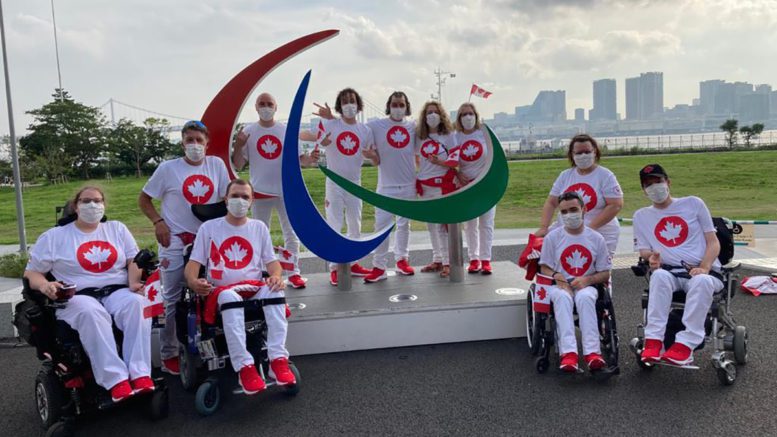There’s no rest for the weary as the Canadian Paralympic boccia team landed back in Montreal from Tokyo in early September, and were set to begin training just two weeks later.
While the team of four Quebecois that represented Canada at the Games did not achieve what they hoped to at the Games, missing the playoff round in the four different events they participated in, there were flashes on display that bode well for the country’s future in the sport.
The experienced Marco Dispaltro, joined in Tokyo by Alison Levine, Iulian Ciobanu in the BC4 class, and Danik Allard in the BC2 class, seemed eager about getting back onto the court with his teammates.
“Next year it’s the World Championships, then in 2023 it’s the Parapan Am Games so it’s very motivating,” said Dispaltro to The Toronto Observer, reflecting on the more condensed schedule leading up to the 2024 Paralympics in Paris.
“Sometimes there’s a long down after the Games because it’s very far away but now it’s a very short turnaround.”
A benefit these four have is that they all train out of the same area in Montreal, something that does wonders on both a logistical level and for team cohesion.
“We are really lucky,” said Levine, to The Toronto Observer. “Even with Great Britain, they’re in different areas of the country.
“The fact that we were able to train with each other was a big asset for us, as well as logistically not having to stay in hotels. We each have our own houses set up and adapted for us. Just those little things that people don’t think of outside of para-sport, it makes things a lot easier.”
The 20-year-old Allard, the youngest member of the team, is an athlete that really benefits from being able to train with the BC4 trio, with Dispaltro referring to him as a “sponge” given how quickly he’s been able to soak up information and execute on the court come time to compete.
“The BC4 team are mentors for me,” said Allard to The Toronto Observer, who shocked everyone by qualifying for the Paralympics so early into his career. “I’ve learned a lot over the years. For me it’s a big opportunity to compete with this team and I appreciate it.”
Marco helped start my career so I just want to say thank you for that. I’m learning a lot from Marco, Iulian and Alison. I’m always learning.”
The Bois-des-Filion native showed improvement in every match he played in Tokyo, dropping a closely contested match to the eventual gold medal winner Hidetaka Sugimura of Japan 6-4, and ended his tournament with a dominant 12-1 victory over Diana Tsyplina of the Russian Paralympic Committee.
He has also made a point of working on his English, which is something that pays off in competition for the BC4 team.
“You don’t want the other team to know what you’re thinking or strategizing about, so it’s quite important to be able to speak another language that the other team doesn’t understand,” said Dispaltro, who finished fifth in mixed pairs alongside Levine and Ciobanu in Tokyo.
“We also have Iulian, our secret weapon, because he speaks Russian and Romanian, and understands Spanish and Italian. It’s very important to have that in our arsenal.”
This close-knit Canadian team is set up well to contend in future competitions.
The 31-year-old Levine entered the Paralympics as the No. 1 ranked player in the world in the BC4 class, as well as being the No. 1 ranked female in the world, which will be a big advantage when men and women are separated for future international competitions in individual play.
Allard will also enter the regional championships in Brazil as the No. 2 ranked player in the BC2 class, rapidly ascending the rankings.
As a former world number one himself, rankings are something Dispaltro knows very well, with Levine referring to Dispaltro as a “numbers guy”.
“Marco told me when he first met me that I was going to be a future top 10 in the world, guaranteed,” said Levine, who ultimately climbed all the way to number one in 2020. “And I looked at him like ‘you’re nuts’. And once I hit top 10 he was like ‘I told you’.”
The 54-year-old sees many of the same qualities in Allard as he did with Levine.
“We knew that with (Allard’s) attitude, especially at tournaments, he just has ice water running in his veins,” said Dispaltro. “That is very rare. Most people when they get onto the court panic a little bit but with him it’s the opposite.
“For Alison, I saw she had the sporting background, mental wherewithal and physical tools to do it. Seeing her for the first time, I knew she had that potential. With Danik, it’s the same thing. They have that mentality and drive to become great.”
The new face of the BC2 class for Canada is going to use every opportunity to learn from his teammates as he can, and just simply work away at his craft to put himself in the best position.
“I just want to work hard,” said Allard on goal-setting for the coming years in the sport. “In three years, I’ll be ready for Paris.”

